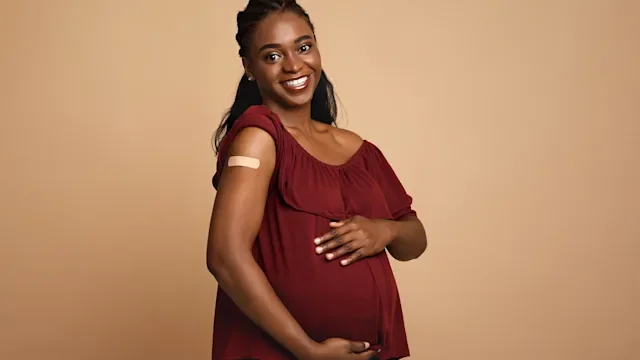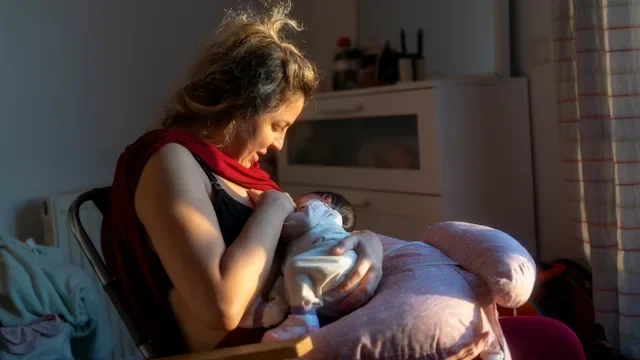Key takeaways:
Not knowing whether you might be pregnant is a common experience.
Missed periods and morning sickness are common signs of a pregnancy, but there are many other possible symptoms as well.
Every pregnancy is different, and different people can experience very different sets of symptoms.
“How do I know if I am pregnant?” How many times is that question asked daily?
Punching the query into Google turns up more than a billion results, which suggests that not being sure whether you’re pregnant is a common experience.
There are some early signs that indicate a pregnancy. The most obvious is a missed period. Morning sickness is another. But there are a plethora of other possible signs of pregnancy, even though not every mother-to-be experiences them.
Search and compare options
Here, four women describe the first symptoms they experienced when pregnant.
Quiz: Am I pregnant?
Frequent urination, nausea and exhaustion
Gabrielle Estell Taylor describes “pregnancy nausea” as different from the nausea you’d feel from a stomach bug or a hangover.
“It’s like you have a lump in your throat, and you feel like you have to throw up all the time. But then you can’t throw up,” she says. “It’s your body just kind of processing you being pregnant and all your hormone imbalances.”

Gabrielle has two boys, ages 7 and 4. With those pregnancies, she experienced nausea and other signs even before she missed a period or took a pregnancy test.
“With my second one, I remember calling my best friend and telling her, ‘I’m pregnant.’ And she was like, ‘How do you know? Have you missed your period?’’’ Gabrielle says. “I told her ‘No, I haven’t, but I’m feeling all the same symptoms I was feeling with my first.’ She's like, ‘No, you’re fine. You’re just tripping. You’re being paranoid.’ Sure enough, I was pregnant.”
The other tell-take signs for Gabrielle, a 30-year-old digital marketer from Riverside, California, were frequent urination and exhaustion.
“I’m not one of those people who is very good about drinking water all day,” she says. “So, immediately, I noticed I had to pee a lot. With both of my kids, I felt the need to go to the bathroom every 5 seconds.”
As for the exhaustion, again, she says, it was different from normal tiredness.
“I feel like, as a parent, you’re tired all the time,” she says. “But with this, you’re pretty much exhausted as soon as you wake up. You’re really dragging throughout the day, finding it hard to move around. And you just feel like your battery is drained.”
A different kind of cramping
Candice D’Angelo has three sons — ages 9, 6, and 3. Like Gabrielle, Candice describes her pregnancy symptoms as different from what she considered normal.
“A really great indicator for me of the process of implantation was cramping,” Candice says. “It wasn’t your usual menstruation cramping. It was a cramp and then some lower back pressure. If you’re trying to conceive, you know your cycle very well. I knew where I was, and I knew that was not menstruation. I knew I was getting pregnant.”

Candice, now a 43-year-old business owner in Fort Lauderdale, Florida, says she was on a girls’ trip when she realized she was pregnant with her first son.
“I was feeling some of that low back pressure,” she says. “I was feeling that cramping very low. I was like, ‘That’s different.’”
She describes it as a cramp in the back of her pelvic area, really low, near the tailbone. Candice says she knows her body very well, which she considers a “gift.” She says it was as if she could feel the egg implanting.
“I knew exactly what was happening,” she says. When she felt something similar in her second pregnancy, she immediately called her husband. “I was like, ‘Listen, I feel the cramp. I know what this is,’” she says. “I knew the [embryo] was implanting, and I was not wrong.”
The second major sign for her was bloating. Again, this was different from menstrual bloating.
“I had some bloating where I was like, ‘I can’t even wear these pants,’” she says.
Intense emotions, tender breasts, bloody noses
Dallas Walden’s frustration poured out after several months of trying to get pregnant.
“I remember crying dramatically and just telling my husband, ‘I don’t feel pregnant,’” she says. “This was the time that I was supposed to be pregnant. And I calculated when everything should happen. I was just overly emotional. And the next day is when I got a positive pregnancy test.”

Dallas — who is 28 and lives in El Dorado Hills, California — now recognizes those feelings as a sign that she was pregnant.
“I had a bunch of symptoms that are associated with early pregnancy, but those same symptoms are associated with menstruation,” she says. “Being emotional. Experiencing a breakout. And then, obviously, the one that stood out the most was my breasts were tender.”
While she often experienced tenderness during menstruation, this was a whole new level, she says.
“They were enlarged. And by the week after I got my pregnancy test, I literally had to go out and buy completely different bras because they’d grown a whole cup size,” she says. “I do Peloton [streaming fitness classes]. And you know, jumping around on the Peloton, or even just bouncing up the stairs quickly, they were so tender I was like, ‘No, we’re going to slow down. I’m going to take things a little more slowly.’”
One sign that surprised her was bloody noses.
“I got bloody noses, probably twice a week, and I did that throughout my pregnancy,” Dallas says. “I guess this is something that usually happens in your second or third trimester. You have such high blood volume, and your blood vessels are obviously thin in your nose, so it is more likely to happen.”
Nausea and migraines
Elizabeth Lake Neuhaus is 36 and has a 2-year–old son and a newborn daughter.
“With both of them, I almost thought I had some sort of food poisoning,” she says. “Before I found out about my daughter, we went over to [a friend’s] house for a dinner party, and I took a few bites of food and couldn’t eat anymore. My stomach was in knots. Two days later, I found out I was pregnant.”

Elizabeth, an outbound marketing specialist from Covington, Kentucky, says it wasn’t that she was throwing up — her stomach was just uneasy all the time.
Once she confirmed the pregnancy, she had a full first trimester of morning sickness. She also experienced migraines.
“I normally have migraines a few times a year, but with both of them, I was having at least one a week,” she says.
She also experienced breast tenderness.
“It was something that I didn’t think about, I just thought I maybe wore my bra too tight,” she says.
Elizabeth says she was more in tune with her body leading up to her first pregnancy, because she and her husband had been trying for months. Her second was a bit of a surprise, but now that she looks back, she experienced a lot of the same symptoms.
“I don’t know why I didn’t put it together sooner,” she says.
What does the doctor say?

Patricia Pinto-Garcia, MD, MPH
Medical Editor
Early pregnancy is a time of tremendous changes in your body, even before you officially become pregnant. In fact, during the first two weeks of pregnancy, you aren’t actually pregnant yet. So, if you’re 6 weeks pregnant, your little embryo is only 4 weeks old. It can be quite tricky to distinguish early pregnancy symptoms from your usual menstrual symptoms, because you produce the same hormones to prepare your body for a potential pregnancy every cycle. However, if you do become pregnant, those hormone levels continue to rise instead of falling, which is what typically happens if you’re not pregnant and get your period.
All these rapid hormone changes, especially changes in progesterone levels, can take a toll on your body. Most people experience symptoms like nausea, tender breasts, back pain, and fatigue. The intensity of these symptoms varies from person to person, depending on how sensitive you are to hormonal changes. If you’ve been pregnant before, you might recognize the symptoms right away. However, it’s important to remember that the only way to know if you’re pregnant is by taking a pregnancy test.
Experts generally agree that the best time to take a pregnancy test is about a week after you miss your period. At-home pregnancy tests detect a hormone called HCG, which is produced by the placenta. You should take the test first thing in the morning, because your urine will contain higher levels of HCG, which accumulates in your bladder overnight. Some tests can detect lower levels of HCG, so you can do them as early as 3 to 4 days before your expected period.
During early pregnancy, your HCG levels double every 48 hours. So if you have a negative pregnancy test but are still experiencing pregnancy symptoms and haven’t gotten your period, you should take another test. It’s possible that your urine didn't contain enough HCG for the test to detect at first, but that could change within a day or two. The changes your body goes through during early pregnancy can be confusing, but taking a pregnancy test will provide you with the most accurate information.

Why trust our experts?

















